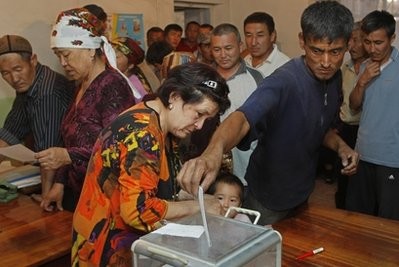Kyrgyzstan's interim leaders on Sunday hailed a strong turnout in a referendum on a new constitution, held in defiance of warnings that it risked inflaming ethnic tensions after deadly clashes.

With five hours of voting left on the constitution which would make Kyrgyzstan a parliamentary democracy, turnout nationwide was already 42.98 percent, the central election commission said in a statement.
The interim authorities have defiantly pressed ahead with the vote despite horrific clashes between minority Uzbeks and majority Kyrgyz earlier this month that killed hundreds and sparked fears the country faced collapse.
Respectable numbers were showing up to cast their ballots in the southern city of Osh -- the epicentre of the violence -- with the situation calm and no reports of unrest, an AFP correspondent reported.
The turnout "rejects the myth that Kyrgyzstan is collapsing, that there is a civil war," said deputy interim government leader Omurbek Tekebayev.
The new constitution would slash the powers of the president and is the centrepiece of the interim government's blueprint for a new Kyrgyzstan after it came to power amid April riots that toppled president Kurmanbek Bakiyev.
Bakiyev, who has taken sanctuary in Belarus, was blamed by the authorities for last month's bloodshed but has denied any involvement. Initial results are expected in the next two days, officials said.
"We will show the world that Kyrgyzstan is united," said interim leader Roza Otunbayeva as she cast her vote in Osh. "We want to heal ourselves from the pain that struck as a result of the tragic events."
The authorities temporarily lifted a curfew in the south -- imposed in the wake of the violence -- so that the vote could go ahead. It will be reimposed after the vote and run from 9:00 pm until 6:00 am, Otunbayeva said.
"I voted 'yes' so that the situation gets better. Many Uzbeks have suffered and several members of my family died. I am scared but I came to vote," said Dlora Kazakbayeva, an Uzbek woman, after voting in Osh.
The new constitution -- if adopted -- will make the former Soviet republic ex-Soviet Central Asia's first parliamentary democracy in a region notorious for authoritarian leaders.
The referendum will set the stage for parliamentary elections that authorities have scheduled for early September to bring in a permanent government.
But several international observers warned the referendum is a premature step so soon after the violence.
Human Rights Watch said the referendum threatened to make the situation "even more volatile" while the International Crisis Group urged the government to reconsider the holding of the poll.
The list of voters was the main problem for the referendum and up to 16 percent of the electorate in some regions would not be able to vote, a total of some 200,000 people nationwide, Tekebayev admitted.
But he said the outside fears were unfounded and also slammed Russian President Dmitry Medvedev and other world leaders for suggesting that the country risked breaking up and "Afghanization".
The Organisation for Security and Cooperation in Europe, the West's main election monitoring body, scrapped a planned mission of 300 observers to oversee the vote because of security concerns.
However large-scale violence has ceased and authorities said Saturday that all 75,000 people who fled the violence to neighbouring Uzbekistan had now returned.
The clashes, which killed 283 people according to the latest toll, were the worst ethnic violence to hit impoverished Kyrgyzstan since it gained independence with the collapse of the Soviet Union nearly two decades ago.
Victims of the unrest have told AFP that the violence was a brutal and orchestrated campaign by armed Kyrgyz militias targeting Uzbeks, who make up about 14 percent of Kyrgyzstan's population of 5.3 million.
Officials have said the true death toll could have been as high as 2,000.
























